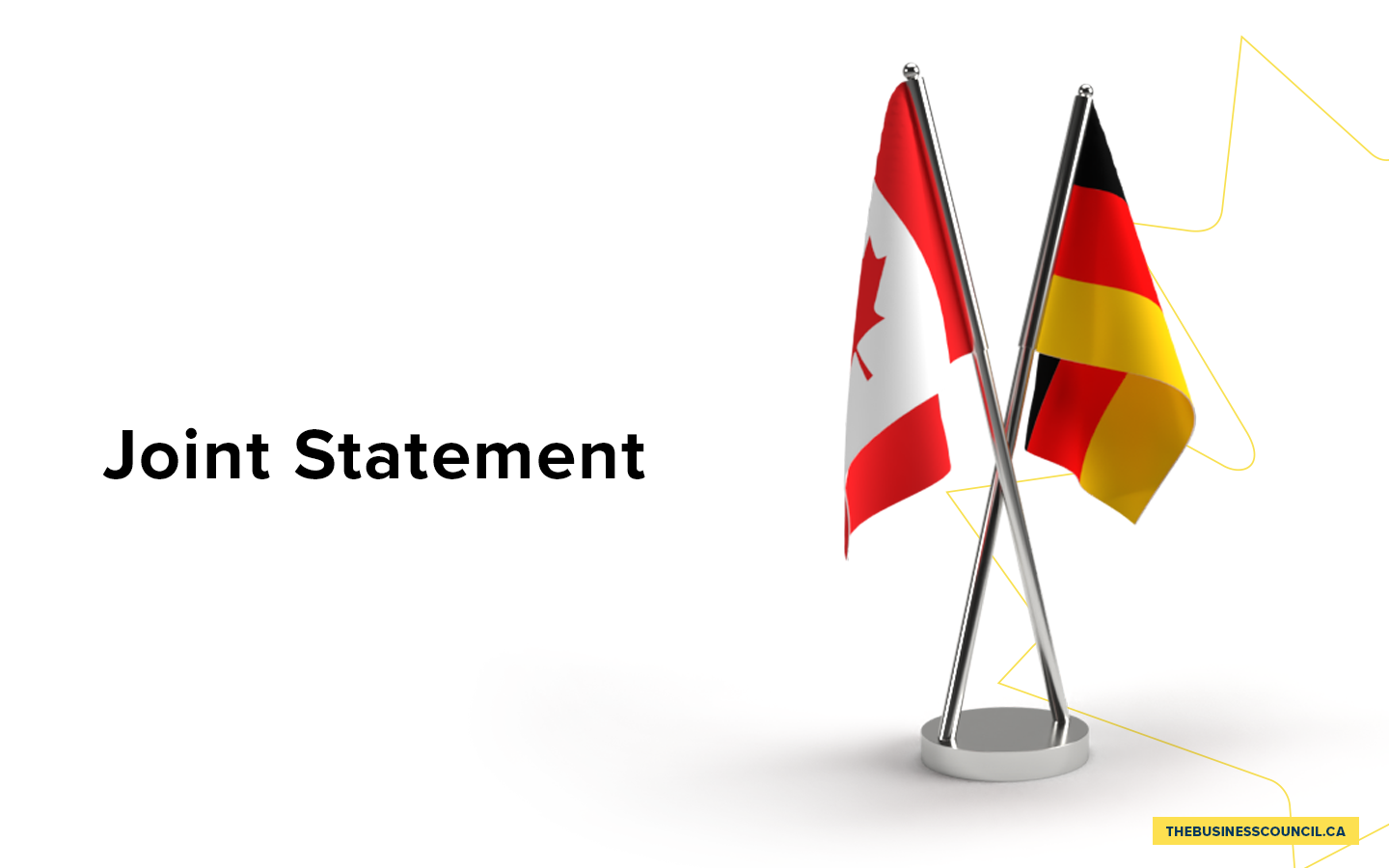Urging closer cooperation between Germany and Canada
On the occasion of the second meeting of the German-Canadian High-Level Steering Group on Bilateral Cooperation in Ottawa on June 6th, and following the recent state visit to Canada by Federal President Frank-Walter Steinmeier, the Transatlantic Business Initiative (TBI), the Business Council of Canada (BCC), the Canadian Chamber of Commerce (CCC) and the Canadian German Chamber of Industry and Commerce (CGCIC) reaffirm the following policy priorities shared by the German and Canadian business communities.
Germany and Canada have been close economic partners for many years. In these uncertain times, it is more important than ever for our two countries, and the European Union, to work together to strengthen economic and political cooperation and defend our shared values. Support for multilateral institutions and rules-based international commerce must remain at the core of European and Canadian economic and trade policy.
Our countries are contending with serious challenges. The pandemic and Russia’s war of aggression against Ukraine disrupted international supply chains and revealed dangerous dependencies. The conflict in Ukraine threatens peace and stability in Europe and has disrupted energy supplies. However, Russia’s belligerence has fostered international cooperation among like-minded countries on a scale not seen since the end of the Cold War.
Business leaders in Germany and Canada stand ready to do their part in helping to overcome these challenges. To that end, we urge closer cooperation between our countries in the following areas:
- Trade and investment: We welcome the German Bundestag’s decision in December 2022 to ratify the Canada-EU Comprehensive Economic and Trade Agreement (CETA). This sends an important signal to other EU countries. Once fully implemented, CETA will deepen economic integration and provide greater certainty for businesses on both sides of the Atlantic. Meanwhile, recent investment decisions have brought Canada and Germany closer together.
- Energy and climate: Hydrogen and its derivatives will play a critical role in decarbonization efforts around the globe. While markets for renewable and low-carbon hydrogen are still in their infancy, increased Canada-Germany cooperation has the potential to accelerate the hydrogen market ramp-up in both countries and support international hydrogen trade.
- Although Germany has successfully eliminated its dependence on Russian energy and increased its capacity to import LNG, Europe’s energy crisis Europe is not over. By speeding up the deployment of Canadian LNG export facilities, Canada could help keep European industry running and households warm next winter and beyond.
- The Hydrogen Alliance established in August 2022 is a strong example of how Canada and Germany can create the supply chains necessary to accelerate the energy transition. Business leaders stand ready to work with policy makers to develop the supply chains required to advance energy transition in Germany and the EU.
- Critical minerals: Germany and the EU are seeking to diversify their supplies of critical minerals by building resilient and sustainable supply chains with trusted and reliable partners. Canada is rich in mineral resources and has much to offer. The Government of Canada is committed to enhancing Canada’s capacity at every stage of the critical minerals value chain: exploration, mining, processing, manufacturing, and recycling. We strongly support these efforts, recognizing that German and Canadian competences and services can complement one another.
- Boosting the supply of critical minerals for the green and digital economy will require:
- detailed mapping of potential exploration and processing projects in Canada or with Canadian investment in other countries;
- a clear understanding of regulatory approval and permitting frameworks and infrastructure requirements;
- exchanges on the mutual recognition, referencing or equivalency benchmarks of sustainability standards in the mining sectors in Canada and the EU, both to facilitate self-assessments and to reduce costs for 3rd party validation audits; and
- Financing and de-risking instruments from both the German and Canadian governments.
- Key enabling technologies: Public and private investments in semiconductor production are urgently required to meet current and future demand. To this end, we welcome investments by the Government of Canada in photonics and semiconductor manufacturing, and those within the framework of the EU Chips Act.
- Semiconductors are essential to the world’s green transition and to a wide range of intelligent and energy-efficient technologies. In support of this transition, Canada and the EU should:
- refrain from any attempt to set up closed semiconductor value chains in their respective jurisdictions, instead fostering closer cooperation in this field;
- ensure equal market access and competition conditions that enable a level playing field, which is beneficial for companies both in Canada and Europe; and,
- promote international standardization efforts in the field of semiconductors.
- At the same time, Canada, Germany, and the EU should enhance research cooperation in the fields of artificial intelligence, quantum computing, and other key enabling technologies.
We urge our governments to create a more favourable business environment by speeding up permitting processes for energy and natural resources projects and expanding opportunities for the funding of related infrastructure.
As business organizations on both sides of the Atlantic, we know that closer international cooperation makes our economies stronger and contributes to a higher quality of life for all citizens. We will continue to support and defend the rules-based international order while working to overcome the many challenges we face. We look forward to working with our respective governments in pursuit of these objectives.
Latest Statements
About the BCC, CCC, CGCIC and TBI
Founded in 1976, the Business Council of Canada (BCC) is a not-for-profit, non-partisan organization representing business leaders in every region and sector of the country. The Council’s member companies employ more than two million Canadians, contribute the largest share of federal corporate taxes, and are responsible for most of Canada’s exports, corporate philanthropy, and private-sector investments in research and development. Through supply chain partnerships, service contracts and mentoring programs, Business Council members support many hundreds of thousands of small businesses and entrepreneurs in communities of all sizes, in every part of Canada.
The Canadian Chamber of Commerce (CCC) is Canada’s largest and most activated business network — representing 450 chambers of commerce and boards of trade and more than 200,000 businesses of all sizes, from all sectors of the economy and from every part of the country — to create the conditions for our collective success.
The Canadian German Chamber of Industry and Commerce (CGCIC) is a not-for-profit organization that has been supporting German and Canadian companies in almost all areas of international trade for over 50 years. Recognized by the German Federal Ministry of Economic Affairs and Climate Action as the official representative of German trade and industry in Canada, and the primary contact for Canadian and German companies wishing to do business in each other’s countries, we provide services, networking, and education to help these businesses thrive.
The Transatlantic Business Initiative (TBI) was established in 2021 to support closer transatlantic economic relations. It serves as a link between German business and the governments of Germany, the United States and Canada as well as the EU’s institutions. The initiative is supported by four business associations: the Federation of German Industries (BDI), the Association of German Chambers of Industry and Commerce (DIHK), the Federation of German Wholesale, Foreign Trade and Services (BGA) and the Association of German Banks (BdB).










